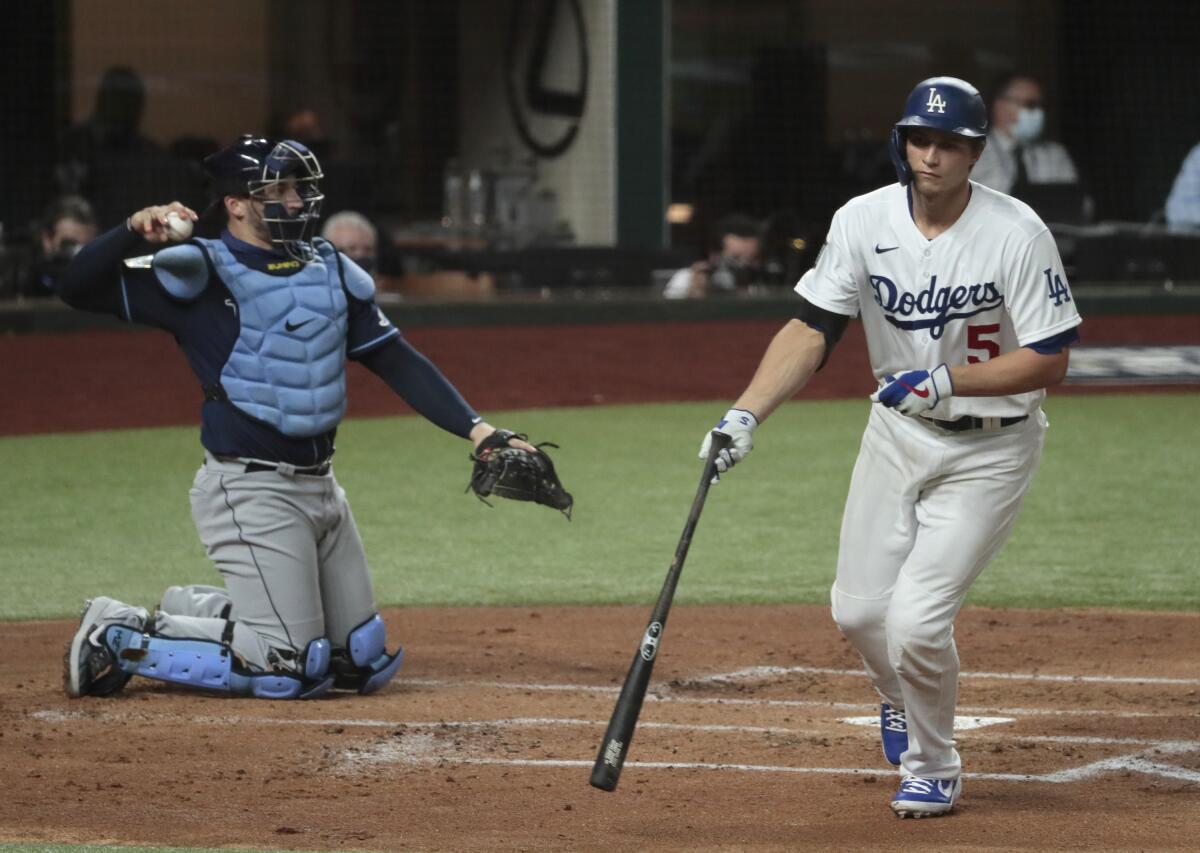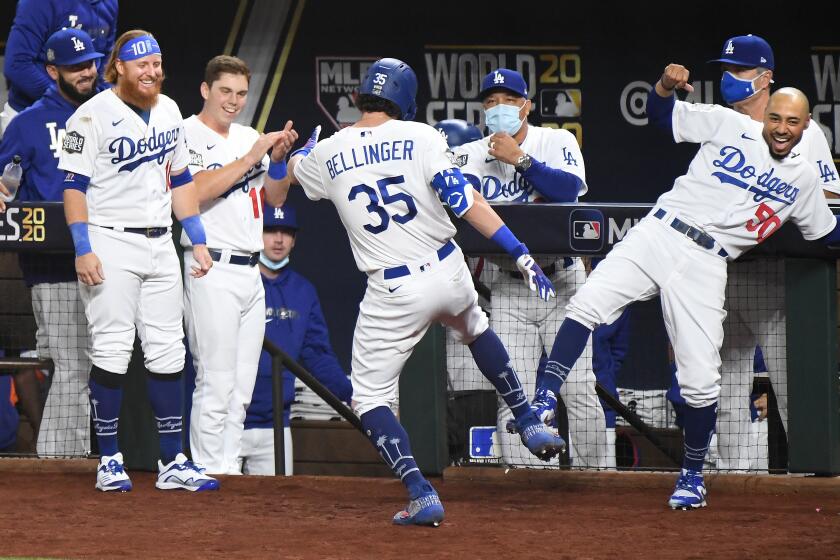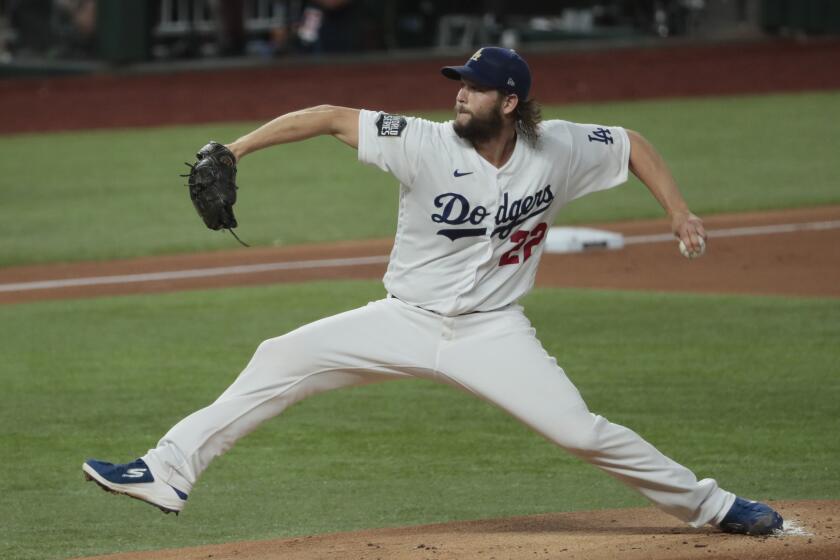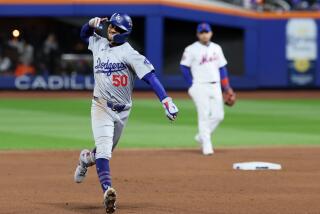Walk this way: Dodgers’ road to World Series title is littered with free passes

- Share via
The phrase is drummed into a baseball player’s head once he’s old enough to don a batting helmet and face a live pitcher: “A walk’s as good as a hit!”
Unless, of course, that hit is a home run. The Dodgers led all of baseball with 118 homers this season, their average of 1.97 long balls per game in a pandemic-shortened 60-game season the highest in major league history.
That power helped fuel the team’s major league-best 43-17 record and a third trip to the World Series in four years, but patience has also been a virtue for the Dodgers in a postseason marked as much by their plate discipline as by power.
The Dodgers drew seven walks in an 8-3 victory over the Tampa Bay Rays in Game 1 of the World Series on Tuesday. Three players who walked came around to score. They drew four walks in Game 2 on Wednesday and one scored.
In 14 postseason games, the Dodgers have drawn 69 walks, with 18 resulting in runs. The Rays, by comparison, have drawn 52 walks in 16 games.
“I think, top to bottom, we’re doing the little things, we’re taking what they’re giving us, it’s not all for the long ball,” Dodgers utility man Chris Taylor said before Game 2. “We’re going to run into a couple, but we’re taking our singles, working counts and getting guys on base more consistently.
“Really, it’s about getting baserunners. Whether it’s a hit or walk, it puts pressure on the pitchers, it gives them something else to worry about. If you can work counts and get that pitch count up, I think they’re more likely to make a mistake.”
And that’s when the Dodgers, who hit 20 homers in their first 13 playoff games, can do serious damage.
“Our guys are not chasing,” manager Dave Roberts said, “but if there is something in our nitro zone, we’re gonna slug it.”

The Dodgers had more of an all-or-nothing, homer-or-bust approach in previous postseasons. They hit .242 with a .786 on-base-plus-slugging percentage, 23 homers, 133 strikeouts and 65 walks in 15 games during their run to the 2017 World Series, a seven-game loss to Houston.
They hit .205 with a .643 OPS, 19 homers, 173 strikeouts and 67 walks in 16 games during their 2018 run to the World Series, a five-game loss to Boston.
And they hit .220 with a .730 OPS, nine homers and more than three times as many strikeouts (64) as walks (20) in a five-game National League division series loss to Washington in 2019.
Did last year’s playoff loss play a part in this October’s more patient approach?
“It did,” Roberts said. “All those past playoff series, with the players who are on this roster, it played a part. They’ve all been through it. Some have had more success than others. Some have had an opportunity to learn from past experiences.”
These Dodgers still love hitting homers, but they also delight in taking borderline pitches for balls and spoiling tough pitches by fouling them off, in “passing the baton” to the next man and extending rallies.
They hit for 30 minutes in a game-breaking, four-run fifth inning Tuesday night. Fittingly, the rally started with Mookie Betts, the new right fielder and leadoff man whom Roberts credits with leading the culture change, and Corey Seager drawing walks off Rays starter Tyler Glasnow.
“It’s been talked about for years,” Roberts said of the team’s reliance on the home run, “but I think that understanding what we’ve been through, some of the failures we’ve had as an offense, the approach … guys are adjusting, and that’s part of experience.”
“We just took good at-bats all night long, really,” Roberts said. “Corey Seager had three walks tonight, and when you’re talking about getting the pitch count up with Glasnow, I thought those were great at-bats and were very pivotal. Just up and down the lineup, really good stuff.
“Certainly, having Mookie here, and his voice with the hitters, with what Corey is doing, what [Justin Turner] has always done in the postseason, it’s just keeping the line moving. We continue to add stress to guys, and I’ve always felt when you’re doing that, it gives us the best chance to put up points.”
Photos from Game 1 of the World Series between the Dodgers and the Tampa Bay Rays at Globe Life Field in Arlington, Texas.
Walks have prefaced some of the bigger hits of the playoffs for the Dodgers. Max Muncy laid off a full-count fastball that was just outside to put two on ahead of Will Smith’s two-out, three-run homer in the sixth inning of a 7-3 win over Atlanta in Game 5 of the NL Championship Series.
Muncy walked in the first inning of Game 6 against the Braves to extend a three-run rally that Cody Bellinger capped with an RBI single. Those were the only runs the Dodgers scored in a 3-1 victory.

Turner sparked a two-out, two-run rally in NLCS Game 7 with a walk. Muncy doubled and Smith hit a score-tying two-run single to propel the Dodgers toward a 4-3 win that punched their ticket to the World Series. The Dodgers drew another seven walks in the World Series opener.
“The best players in the game, year in and year out, control the strike zone — they swing at strikes and take balls,” Roberts said. “I believe that leads to championship baseball on the offensive side. It’s about passing the baton, getting on base, not just chasing hits. We’ve done it very well this postseason.”
Clayton Kershaw has waited a long time for October glory, and his World Series Game 1 performance for the Dodgers was worthy of a championship.
More to Read
Are you a true-blue fan?
Get our Dodgers Dugout newsletter for insights, news and much more.
You may occasionally receive promotional content from the Los Angeles Times.











